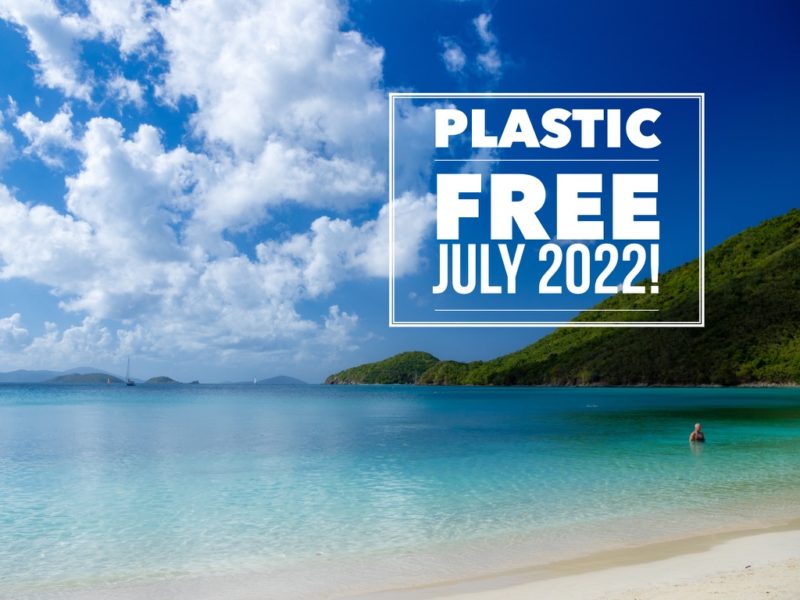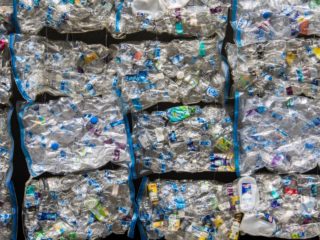What is Plastic Free July?
Plastic Free July is a global movement that empowers people to be part of the solution to plastic pollution. The concept is simple: Participants are challenged to reduce their reliance on single-use plastics by eliminating one or more single-use items from their daily lives.
In an effort to stay healthy it can be tempting to assume that single-use plastics are more hygienic than their reusable counterparts. The fact is that reusable items — cups, bags, containers — pose no health risks. As long as you keep your reusable items clean, they are just as clean, if not cleaner, than single-use products.
Why July?
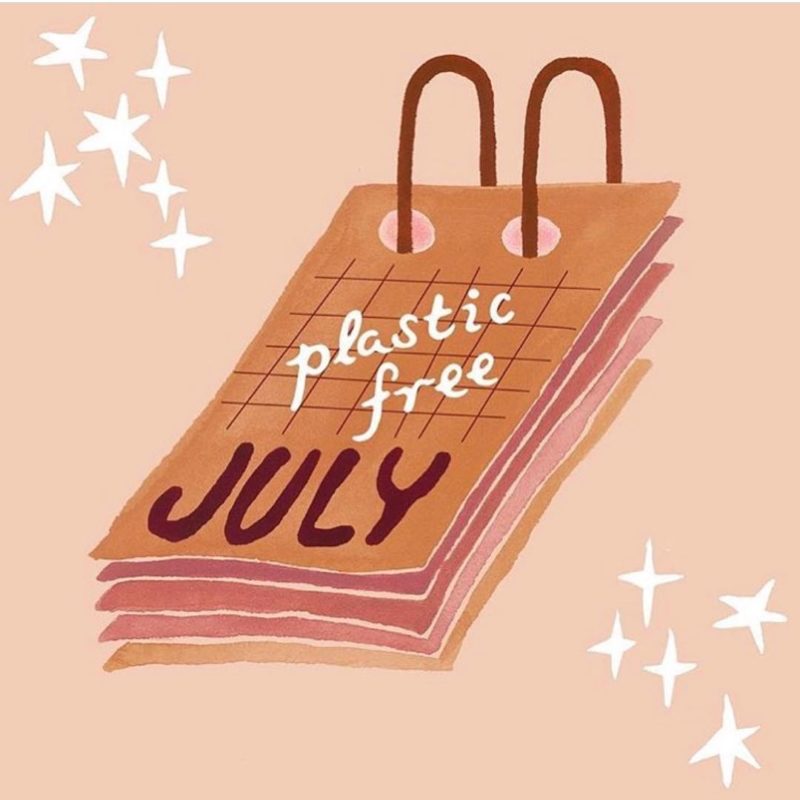
My first thought when I first heard about Plastic Free July was, why just July? Shouldn’t we be curtailing our dependence on (single-use) plastic every month of every year?
As I read more, however, it became clear how effective the strategy was to focus on this brief time period. During the sunny summer month of July when we’re typically enjoying carefree days outdoors, relaxing at the beach, or taking a swim in the ocean, our appreciation of nature and the environment is at its peak. What better time to highlight the ever-increasing build-up of plastic waste that saturates our land and waterways?
So this July, join me in taking the Plastic Free Challenge: eliminate one or more single-use plastic items this month. And you’ll see how easy it is to make that change a lasting one! Here are some ways to make a change this Plastic Free July, and beyond.
Stop Sucking! Say No to Plastic Straws
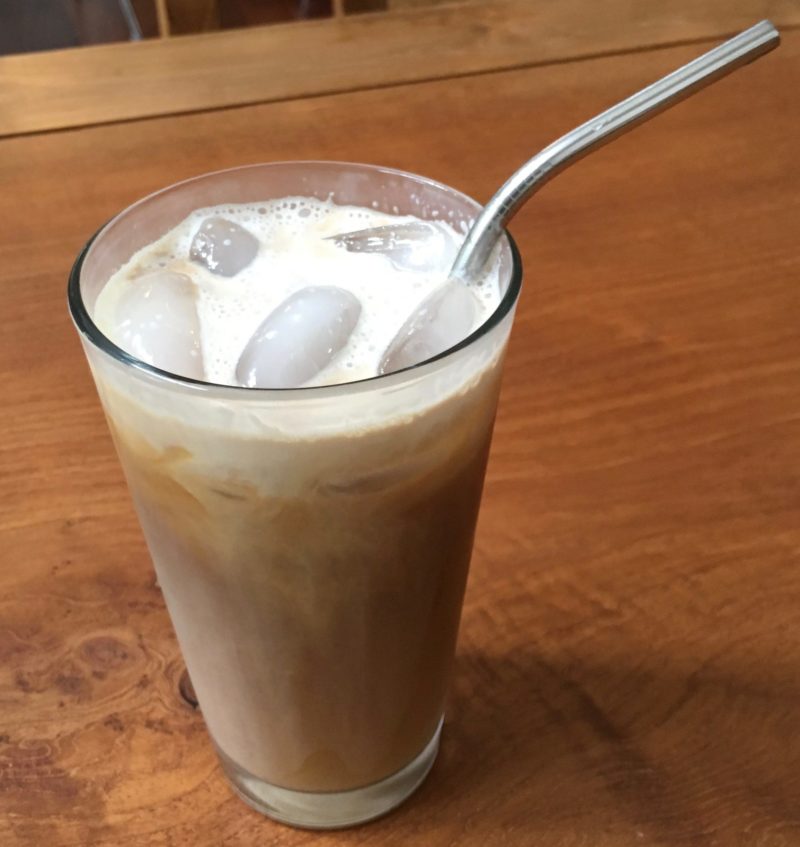
Choose to Reuse
Just say “no, thanks” to plastic straws when you’re at a restaurant or buying a drink. It’s that simple!
If you need or want a straw, there’s a reusable alternative to suit every need. There are even convenient foldable straws that fit in your bag or purse.
Make a Pledge
Now that you’re armed with your reusable straw(s), make a commitment (beyond July!) to not use plastic straws. You can make a personal pledge or join others in speaking out to reduce plastic pollution: Plastic Pollution Coalition’s Last Plastic Straw initiative outlines a number of ways, including a pledge, to take action on reducing plastic straw pollution.
Why All the Fuss About Plastic Straws?
Are you wondering, what’s the problem with plastic straws? How can something so small and insignificant be part of an environmental pollution crisis?
It’s true that plastic straw pollution isn’t the main plastic waste culprit, but it’s a big one. The good news is that the solution to plastic straw pollution is one that you can be a part of. And the more of us who say no to plastic straws, the more impact we’ll have in influencing manufacturers to stop making these products.
For more background information on plastic straw pollution, read Green That Life’s post on the subject and watch the excellent STRAWS documentary film.
Some good news: New York’s City Council passed legislation restricting food-service establishments from providing single-use plastic straws to customers, with the exception of straws upon request. It also bans plastic stirrers.
Bring Your Own (Reusable) Bag
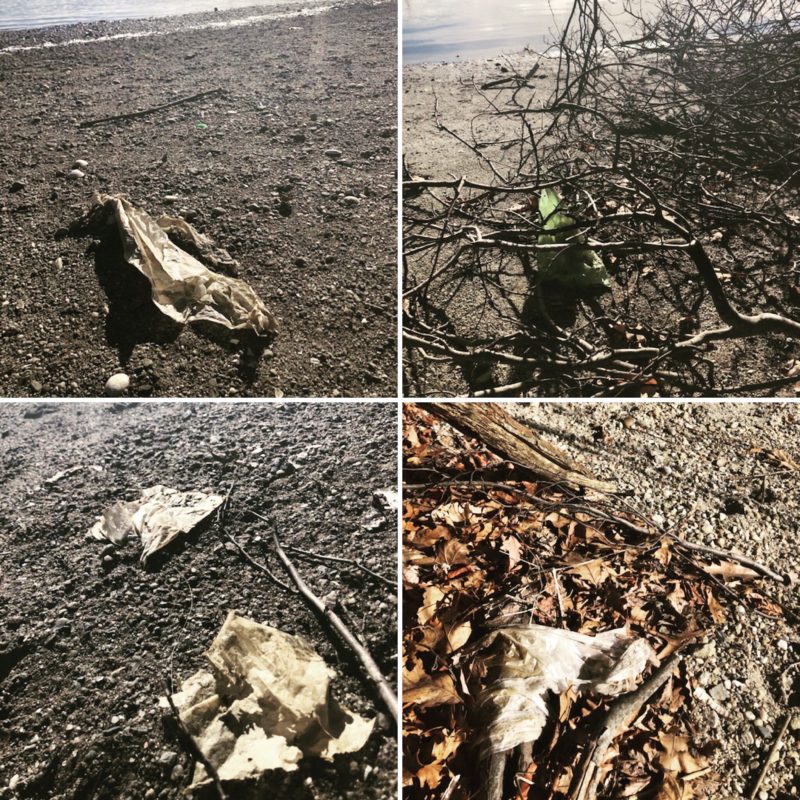
Shopping Bags
Make it a Plastic Free July by remembering to take your reusable shopping bag with you. Don’t have a car to tote around large bags? No problem! These collapsible bags are small enough to fit in a purse or even a pocket but they’re durable and, of course, reusable.
- Shopping tote. Chico’s collapsible shopping tote has a handy carabiner clip to attach to your purse, backpack, or any bag!
- Tote or lunch bag. In my opinion, Baggu totes are the prettiest, with a pattern to suit every taste.
- Large shopping bags. For those big shopping trips, Bee Green foldable bags are a great choice.
- Net bags. Stoncel net bags are a stylish addition to your shopping trip.
Produce Bags
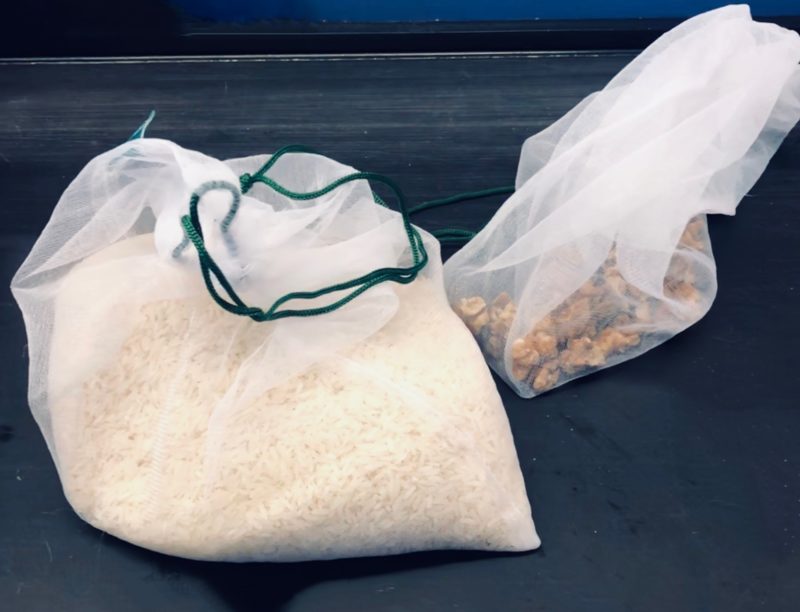
Invest in a few reusable produce bags so you don’t have to reach for the plastic ones in the store. And if you forgot them at home, no worries, just leave your items loose. Give the produce a thorough wash when you get home.
- Cloth. Simple Ecology has a variety of different-sized organic cotton muslin bags to suit every need.
- Net/Mesh. My ChicoBag produce mesh bags have lasted for years. I also like Bewise Earthwise mesh bags, though they’re a tad more delicate than the ChicoBag version.
What’s Wrong With Plastic Bags?
Plastic bags are an enormous plastic waste problem. They’re made from non-renewable fossil fuels, are used for a few minutes, and then tossed in the garbage or left to litter our planet (virtually) forever.
Can you recycle plastic bags? Technically, yes. Realistically, no. They need to be absolutely clean and can only be processed in recycling facilities that can handle their flimsy material. The market now for recyclable plastic bags is basically non-existent due to policy changes made by China, once this country’s main importer of plastic recyclables.
For more resources and reading material on plastic bag waste, see Section 8 of Green That Life’s post on How to Pass a Plastic Bag Law.
Reusable Bottles and Mugs
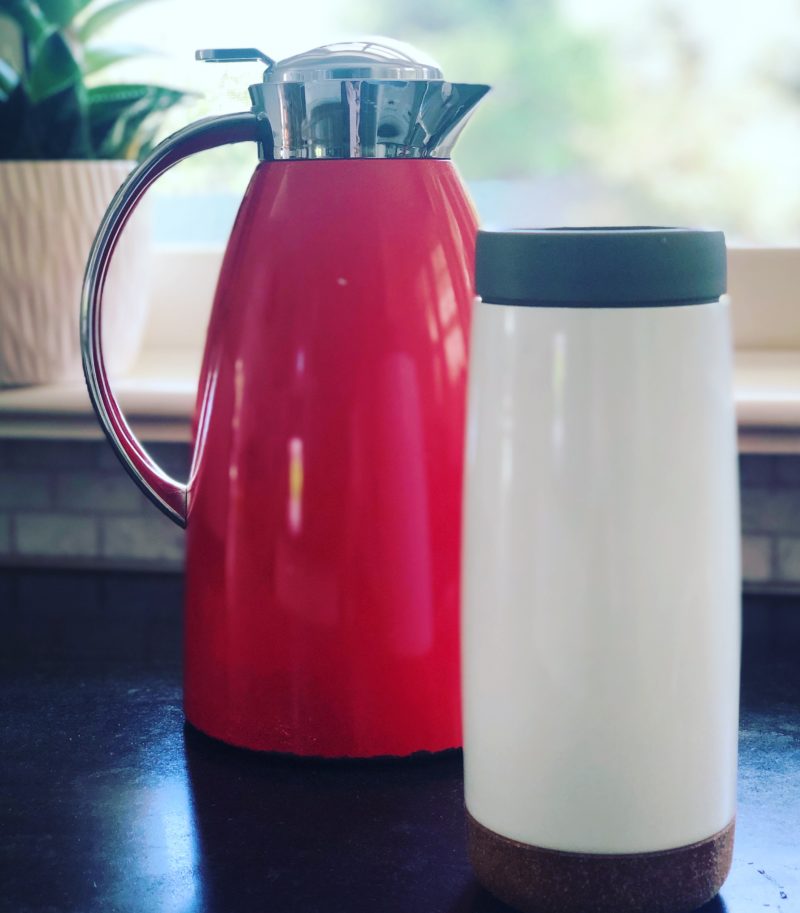
This is an easy switch to make during Plastic Free July (and beyond) because there are countless varieties of reusable bottles and mugs to suit every situation and need. Bring a couple with you when you’re out so you don’t have to take a disposable coffee cup or buy bottled water. Better yet, make coffee at home!
Here are my favorite reusable bottles and mugs, but for more picks see Green That Life’s post on How to Reduce Waste on the Go.
Bottles
- All-purpose. The LifeFactory glass water bottle with Active Flip Top Cap is my go-to reusable bottle.
- Glass tumbler with straw. Now that you’ve eliminated plastic straws, try the Ello glass tumbler with straw.
Mugs
- Stainless Steel. I wasn’t a fan of stainless steel coffee mugs until I found the Ello Cole mug. It’s the perfect shape to carry (I’m a bit of a klutz) and the cork base guarantees it’s slip-proof. (I wouldn’t, however, call it completely leak-proof.)
- Glass. I’ve used KeepCup’s glass cups over the years and like their shape and feel. Note that they do leak and lose heat faster than stainless steel versions.
Filtered
Worried about the water quality coming from your faucets? Purchase a water filter pitcher or invest in a water filter faucet. We installed an Aqua Pure under-counter filtration system a few years ago, which was ideal for our large (thirsty!) family. You can also get filters that mount directly on top of the faucet.
Wrap it, But Not With Disposable Plastic
Plastic film. Do you really need it? I say, no. There are so many reusable alternatives to choose from:
- A plate to cover leftovers.
- Beeswax. I use Bee’s Wrap brand and like their assorted sizes for different uses. Just wash and reuse.
- Stretch lids. Try these reusable silicone food covers on bowls, containers, and even produce.
- Parchment or wax paper. There are tons of brands to choose from. I like If You Care brand. The parchment paper is chlorine-free and certified compostable.
Reduce Your (Single-Use) Plastic Packaging
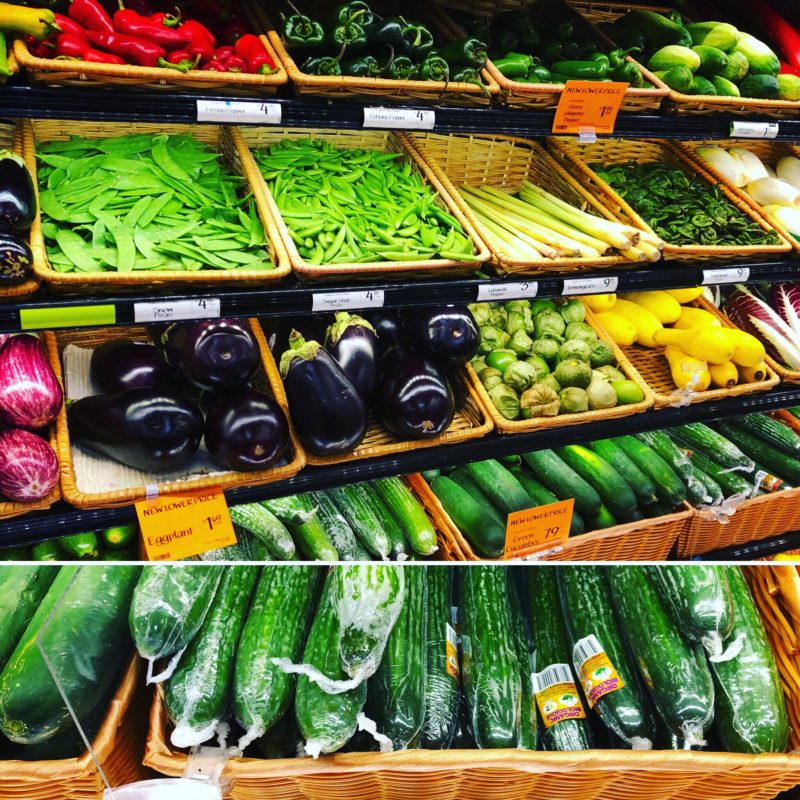
Plastic packaging seems to magically wrap itself around everything. Somehow, we consumers have allowed ourselves to be duped into thinking that everything must be packaged. And, of course, with plastic packaging: plastic-wrapped cucumbers? Absolutely. Individually packaged Coke cans? Yup. Plastic containers of peeled oranges? Sure.
The insanity goes on and on, and we’ve come to accept it. Well, you don’t have to. You have the power to ignore these marketing shenanigans that create a false message of necessity.
Most of the time we don’t need all that packaging. Even more importantly, all this plastic packaging is made from non-renewable fuel sources. It’s used for a brief time before being thrown away or left to litter our planet.
In fact, nearly 50% of the plastic waste generated is from plastic packaging, most of it unnecessary.
So, instead of containing food (or other items) in single-use receptacles, go for reusable alternatives during Plastic Free July.
Reusable Snack and Storage Bags
We’re so used to reaching for the plastic baggie to store snacks or leftovers. The problem is unless you clean it after use (and yes, you can), that bag gets thrown in the garbage after one use.
- Zipper. (Re)zip bags come in a bunch of sizes to suit every need. Leakproof and safe for the freezer. Stasher brand is dishwasher and microwave safe.
Bring Containers With You
While shopping. Take advantage of the bulk food sections at the grocery store. Bring your reusable container or produce bag to stock up. Some stores will even allow you to bring your own containers from home to fill prepared foods.
Make your own on-the-go meal, and package it in reusable containers. Enjoy, using reusable utensils.
Food containers. Black & Blum’s stainless steel lunchbox has a divider for different foods. For salads, Rubbermaid’s Brilliance Food Storage Salad Container is a great choice.
Cloth Wraps. My favorite: Wrap-n-Mat.
Utensils. Try bamboo: To-Go Ware bamboo utensil set. Or stainless steel: OASMU’s set, which also includes straws and a cleaning brush.
Take Action
Start Something
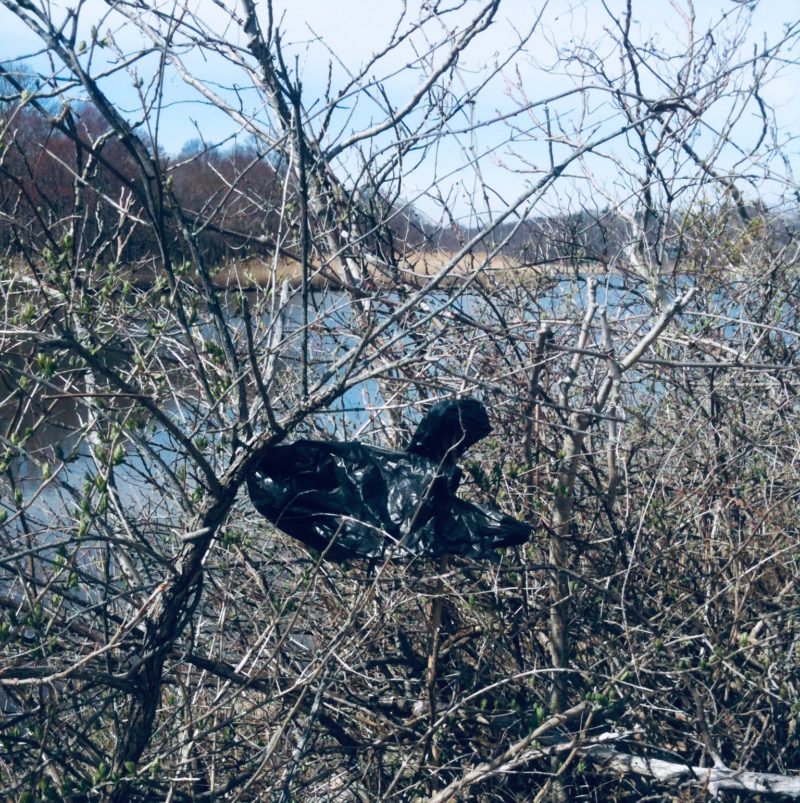
Plastic Free July is a perfect time for you to think beyond your personal lifestyle habits and help inspire others to make a change with you. Consider starting a campaign to reduce single-use plastic in your neighborhood or even your town. You don’t have to venture far to make a positive impact.
In 2009, I spearheaded a reusable bag initiative in my town, which led to the first plastic bag law in our county. When I started, I wasn’t a legislator, an environmental expert, or an activist. I was just a person who was passionate about reducing plastic pollution in my coastal community. With a few other committed residents, we made a difference in our town. You can too!
Read about my experiences and lessons learned, here.
Clean up
Participate in a beach clean-up or simply pick up plastic litter you come across. You’ll be surprised by how much you find when you actively look for it.
Get Involved
If starting something new seems too daunting, join an environmental organization and help them take action in raising awareness. Giving your time, even if it’s just an hour or two a week, can make a difference.
Become a Smart Consumer
While we can do our part by altering our individual lifestyle habits, real change will come with systemic, cultural changes that move us away from a consumer society focused on convenience and single-use products.
How can you play a part in achieving this cultural shift? First, become an informed consumer by taking a few minutes to check whether your preferred brands engage in sustainable business practices, not greenwashing tactics.
Second, at the ballot box, become an informed voter. Support candidates who push for systemic change through policies, such as Extended Producer Responsibility regulation, that hold plastic producers accountable for waste reduction.
We’re in this Together
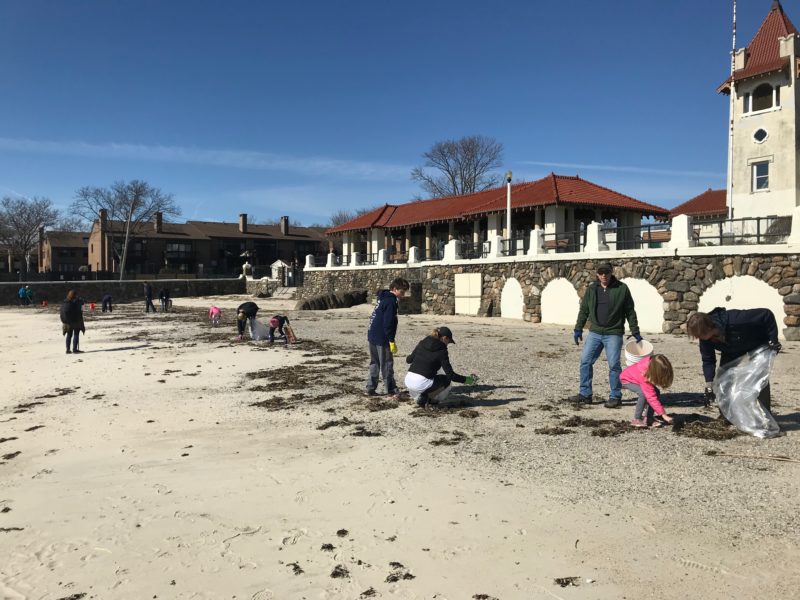
Ok, it’s not a tip, but it’s a reminder that you’re not alone. We can accomplish so much more when we work together, inspiring, and supporting each other in a positive, guilt-free environment.
The more of us that make a change this Plastic Free July and in the months to come, the more we can influence our friends, family, and community to make a change in their lives. So let’s get started this July!

